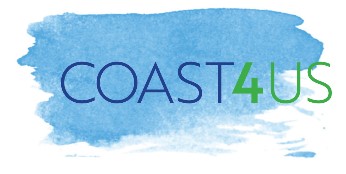Pudzis, E., Geipele, S., Auziņš, A., Lazdiņš, A., Butnicka, J., Krumina, K., Ciuksa, I., Kaļinka, M., Krutova, U., Grimitliht, M., Prii-Pärn, M., Björklund, C., Vävare, S., Hagström, J., Granqvist, I., Hallor, M.I. Evaluation of Formal and Informal Spatial Coastal Area Planning Process in Baltic Sea Region. Int. J. Environ. Res. Public Health / Environmental Sustainability in Maritime Infrastructures, 2021, 18(9),4895. DOI: 10.3390/ijerph18094895
About INTERREG CB project
Interreg Central Baltic Programme Project Coast4us (Coast for us) implementation period: 1 January 2018 – 31 December 2020. To achieve the goals of the project, a consortium of municipalities, universities, public administrations from Sweden, Finland, Latvia and Estonia has been set up – a total of 18 partner organisations and 9 associate partners. This 3-year project will be implemented by the Institute of Civil Engineering and Real Estate Economics. Participants of the project are the staff members of the Institute of Civil Engineering and Real Estate Economics of RTU: Project Manager – Leading Researcher Dr. Sanda Geipele, Visiting Researcher Dr. Māris Kaļinka; Researcher MScIng Una Krutova and Senior Expert Dr. Andrejs Lazdiņš.
Aim and objectives
Coast4us project aims at developing an innovative, comprehensive and local needs-based planning approach to the development of marine and coastal areas in Finland, Latvia, Sweden and Estonia.
The priority of the Interreg Central Baltic Programme 2014–2020 is “sustainable use of common resources”; the specific objective of the priority is “sustainably planned and managed marine and coastal areas”. The main activities in Latvia are planned in pilot areas of the municipalities of Carnikava, Saulkrasti and Salacgrīva, where planned solutions will be implemented, identification and mapping of existing and potential values will be carried out. As the coastal areas of the project are of a significant natural, cultural, economic and social value, there is a necessity for a diverse range of stakeholders with specific interests and needs, innovative methods for sustainable development planning in accordance with the modern age of growth, as well as work with local communities in specific pilot areas. Within the framework of the project, through practical and educational activities, it is envisaged to develop quality dialogue and cooperation between the parties involved in the planning process, devoting particular attention to the local community level, promoting the local needs-based development planning approach.
Project activities and benefit
The Coast4us project will be carried out at the local level, promoting not only economic development but also social innovation. During the Coast4us project, a completely new level of development planning – the village and community – will be introduced, since identifying the situation, planning and implementing pilot projects, including the participation of national and regional administrations as partners, will ensure further implementation and sustainability.
The main benefit is shared experience of coastal local planning using new methods. As all levels – villagers, municipalities, the Ministry of Environmental Protection and Regional Development and the University – are involved, the results of pilot activities will be summarised and already included in the proposals for local/village planning in Latvia.
Science partnership makes up a particularly strong partnership, as the three major universities of the Coast4us project will bring together worldwide best practices for the implementation of the planning level, while ensuring scientific debate and knowledge dissemination at the EU and wider level.
Project activities
Mapping and preparation for the planning process, including the Institute of Civil Engineering and Real Estate Economics of RTU is responsible for the sub-activity in Latvia: development of planning tools (GIS, IT tool planning, smart city planning, etc.).
Planning process and development of sustainable plans
Evaluation and dissemination. The Institute of Civil Engineering and Real Estate Economics of RTU is the responsible partner in the project for the introduction and implementation of this activity. An international scientific conference will be organised within the framework of the activity, as well as scientific articles will be prepared for international scientific journals on territorial development issues.
Management and Communication.
Scientific publications
Project Results
The Coast4us project added new data and tools to the municipalities’ spatial planning practices. Online GIS planning portals developed in the project make it possible for planning authorities to share and update data for the planning process. This makes it easier to analyse management options and consider important ecosystem services and nature values when constructing plans, making sustainable development possible. The new data and visualization methods developed in Coast4us help communities better understand and evaluate how different development strategies will impact their area. Transfer of knowledge between the project partners of data sources, GIS layers, values, and the use of data and tools has created better understanding of different approaches that can improve sustainable and holistic planning. Examples of new GIS layers and data produced in our pilot areas are cultural historic buildings, flooding areas, infrastructure, socio-economic analysis, local water management plans, underwater vegetation, fish reproduction, water quality, ecosystem services, and how people move through the areas.
The project has discussed sustainable solutions for problems affecting values of coastal area through participatory and planning processes by using a holistic approach and combining technical tools. The main results are eight sustainable development plans by eight municipalities, pilot areas. In these areas, different methods and tools have been tested to map different social, economic, cultural and ecological values, to activate inhabitants and to increase local participation in areas with conflicting interests. This more inclusive method, together with additional knowledge and data provided, made a holistic and proactive planning process possible.
Main results and more information about the project can be found here: coast4us.com
More information about project
The priority of the Interreg Central Baltic Programme 2014–2020 is “sustainable use of common resources”; the specific objective of the priority is “sustainably planned and managed marine and coastal areas”.
Project Manager at RTU: Leading Researcher of the Institute of Civil Engineering and Real Estate Economics Dr. Sanda Geipele, e-mail: [email protected].
Total project cost: € 3 084 924.34
EU funding: € 2 399 828.62
EU funding at RTU: € 153 000.34 (incl. RTU co-financing: € 24 480.06)
INTERREG CB Programme Project Coast4us (Coast for us) implementation period: 1 January 2018 – 31 December 2020.




